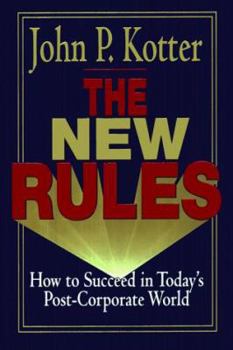New Rules: How to Succeed in Today's Post-Corporate World
Select Format
Select Condition 
Book Overview
Based on a landmark twenty-year study of 115 members of the Harvard Business School's Class of 1974, this vital and important book describes how the globalization of markets and competition is... This description may be from another edition of this product.
Format:Hardcover
Language:English
ISBN:0029175860
ISBN13:9780029175866
Release Date:January 1995
Publisher:Free Press
Length:238 Pages
Weight:1.25 lbs.
Dimensions:1.0" x 6.4" x 9.6"
Customer Reviews
3 ratings
Outstanding advice for workers of all levels...
Published by Thriftbooks.com User , 24 years ago
Similar to the advice offered by Darden finance professor Bob Bruner, himself a member of the HBS class profiled in this book, Kotter demonstrates that those who shunned the corporate world in favor of more impactful jobs with smaller companies have succeeded beyond the levels of their corporate ladder classmates. Go to small companies and make a difference in the world. Push yourself. Don't accept a slow climb up a bureaucratic corporate ladder. The book has numerous student profiles to demonstrate the benefits of the road less traveled. Kotter fleshes out the backgrounds and experiences of the students as effectively as character development in a Stephen King novel. The characters come to life and you really feel the urge to break out and go with the start-up company of your own or others. Considering today's dot-com world this advice from the mid-90's appears ahead of its time. Relative to his other books this one is average, but what's average for Kotter would be exceptional for most.Also by Kotter: "Leading Change" and "What Leaders Really Do" are also outstanding works by Kotter. HBR article Managing Your Boss (incorporated into "WLRD") is a great reading for MBAs, managers, and workers of all levels.
A Real Gem
Published by Thriftbooks.com User , 26 years ago
Dr. John Kotter of Harvard Business School is one of the few scholarly business writers who consistently blends leading edge, visionary concepts with the tough-mindedness that most successful executives admire. I bought this book while looking for something else entirely, but it was well worth it. I certainly discovered a real gem. Kotter gives us straight talk about the hard realities of today's executive business world. He disabuses us of the notion, if any of us still hold it, that there will be any safety or security in a career based on steady upward mobility in a traditional corporation. He wraps his stoic "new rules" around a twenty-year longitudinal study of the careers of Harvard Business School graduates of the Class of 1974. Showing the actual career paths of a plethora of genuine American success stories is not only fascinating reading, but highly educational. Kotter bluntly states what it will take to be successful at work in the 21st century: "Settling for good, much less mediocrity is dangerous..Large numbers of people have been taught by big business, big labor and big government that fair-to-good is adequate...ten years from now fair-to-good will probably NEVER lead to success." In order to get beyond the "fair-to good" range of performance, Professor Kotter makes a strong case for executive assessment, maintaining that a careful, realistic and candid self-examination is imperative, and he places special emphasis on the need for self-awareness regarding gaps in one's development. He couples this with counsel on the need for constant learning. What does Kotter's study imply for our concept of Executive Community? He says that for those who aim to lead large organizations, their role should be that of the revolutionary, breaking down hierarchies and replacing then with a "flexible network organization" with many more people taking up the responsibilities for leadership. There is a need, he says, to create "self-confidence in competitive situations" through education in both schools and business organizations. Kotter calls the new business environment "Phase III", marked by globalization of markets and competition. He urges readers who feel that they are working in a business environment "that is not helping prepare him or her for an even tougher Phase III future should move out of that environment as fast as possible. AS FAST AS POSSIBLE." I love Kotter's sense of urgency. And he is right about so many things, that, if you have not done already, get this book AS FAST AS POSSIBLE. It may be the best business book you have read in a very long time, and one of the few that may stir you to self-improvement.
A must-read for future MBA's
Published by Thriftbooks.com User , 27 years ago
Harvard Business School professor John Kotter has followed the career paths of the members of the Harvard Business School Class of 1974 -- and what he has found will astonish you if you are like me -- an MBA hopeful working for a large corporation. Kotter observes that the Harvard MBA's have succeeded financially and personally because they have followed volatile and nontraditional career paths outside of large firms. He argues that the world economy is so globalized and the boundaries of corporations are so blurred that the best career opportunities abide in the virtual corporation. In this new career marketplace, great rewards accrue to competitive risk-takers who continually renew their skills. Read this, but be warned: You may decide to quit your job and never work for a large corporation again. -- Dan Green, Harvard Business School Class of 1999.





